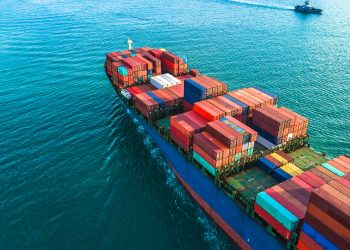Maritime Mutual published a risk alert focusing on how to minimise bagged cargo damage and consequent shortage claims.
According to the risk bulletin, large cargoes of bagged food products such as rice, sugar and flour are regularly shipped on board bulk carriers and general cargo vessels.
The related loading and discharge operations, particularly at developing nation ports, can be problematic due to stevedore negligence or even deliberate rough cargo handling which result in broken bags, cargo spillage and facilitate stevedore pilferage.
As a result, Maritime Mutual aims to raise awareness of these problems and provide recommendations so as to minimise bagged cargo damage and consequent shortage claims.
What types of foreseeable or deliberate damage can occur?
- Bags can weigh up to 50 kg such that they can be difficult to carry and handle manually. As a consequence, stevedores often make up sling loads within and under the cargo hold wings and well outside of the hatch square. These loads will then be dragged out by the crane hook or derrick hoist wires and across the top of cargo in the hatch square. This often results in ruptured bags and spillage. The damage suffered is not usually deliberate, but it is foreseeable and preventable.
- Stevedore crane drivers or winchmen may intentionally cause slung bags to rupture by swinging and contacting sling loads heavily against the side of the hatch coaming as they are being raised or lowered from the cargo holds. This kind of damage (as a precursor to pilferage) is deliberate, but it is also preventable.
- Stevedores may carelessly or, more likely, deliberately rip open bags with cargo hooks or deliberately cut them open with knives in order to pilfer the cargo. Again, this kind of deliberate damage and theft is preventable.
What losses may then be sufferred?
When food cargo bags are ruptured, cargo loss will usually occur in two ways:
- The pilferage of spilled cargo is usually confined to smaller quantities of cargo which can be concealed in the clothing or knapsacks of stevedores. However, as there are often 10 or more stevedores in a hatch gang and if cargo operations extend to multiple shifts, these small quantities can quickly add up to significant losses.
- Probably larger that the losses from pilferage is the cargo spillage residue which ultimately works its way down to the bottom of the cargo hold as all bags are discharged. This cargo then becomes contaminated with dirt and although it can be swept up and re-bagged, it becomes unusable; except perhaps as animal feed at a greatly diminished value.
Steps to prevent bagged damage and loss
Formal planning for cargo operations security should be completeted on board prior to arrival at the load or discharge port. These plans should incorporate the general requirements of the ship’s ISPS security plan together with specific cargo operation requirements. MM recommends that this should include:
- Master’s pre-arrival awareness of his charter party and/or bill of lading obligations in relation to the overall supervision and control of loading and discharging operations.
- Master’s pre-arrival notification of the number of cargo hatches to be worked simultaneously, the scheduled times of working and the number of stevedore gangs and personnel which will board the vessel.
- Master’s on-arrival receipt of the names and 24/7 contact details of the Stevedore Foreman, the Charterer’s Agent and the Cargo Consignee or their Representative.
- Agent’s confirmation that stevedore identification will be issued by the port authorities to assist the ship’s control of all stevedores boarding and disembarking the vessel in full conformance with the ISPS Code and IMO MSC/Circ.1132.
- Consideration of the appointment of independent surveyors to represent and protect the Member’s interests by:
- Tallying the bagged cargo being loaded or discharged.
- Ensuring that any damaged bags being loaded are returned ashore and replaced by undamaged bags and that any bags ruptured during discharge are re-bagged immediately.
- Providing a full and detailed report of the cargo operations and any observed problems and losses.
- Ensuring all ship’s Officers of the Watch (OOWs) understand that:
- All stevedore related incidents (inclusive of the three types of foreseeable or deliberate damage described above) must be reported immediately to the Chief Officer and/or the Master.
- All cargo damage and loss incidents observed are to be photographed and recorded in the ship’s deck log with the location, time and nature of and their apparent cause.
- Ideally, stationing a member of the ship’s crew at each cargo hatch where loading or discharging is taking place to observe, record and report continuously all stevedore activities and incidents to the OOW.
Key points
- Bagged food product cargoes which are not loaded into containers and which are shipped as break-bulk cargo on board bulk carriers or general cargo vessels are likely to suffer cargo loss and damage due to foreseeable or deliberate bag rupturing or tearing by stevedores and consequent pilferage.
- Experience suggest that the amount of the damage and loss will be higher in developing nation ports, where the motivation to pilfer the cargo may be increased by low stevedore wages and poverty.
- In circumstances where bagged cargo damage and pilferage occur, claims may include spilled cargo re-bagging costs and shortage claims deductions by charters from freight or hire. Customs ‘fines’ for short delivery may also be imposed and cargo interests may threaten ship arrest or detention.
- All in all, not a good place for a shipowner Member to be. Members who are involved in the bagged food products trade are therefore encouraged to ensure that their ship managers, DPAs, Company Security Officers (CSOs) and Masters are made aware of this Risk Bulletin. Members should then ensure that MM’s loss prevention recommendations are fully implemented.




































































